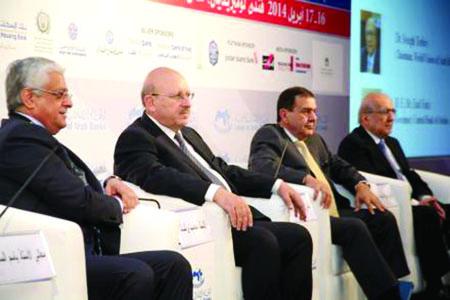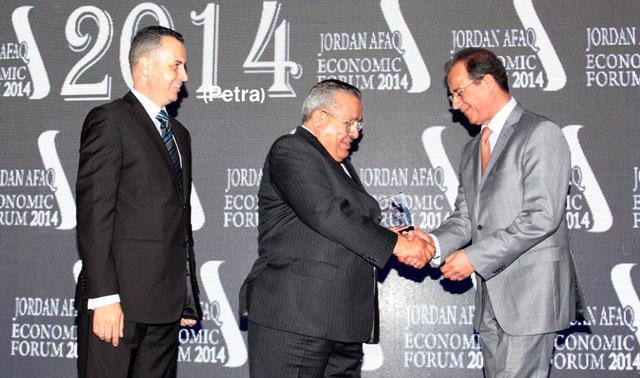You are here
‘Arab Spring’ chills Mideast economies
By Dana Al Emam - Apr 16,2014 - Last updated at Apr 16,2014

AMMAN — Arab bankers on Wednesday blamed "Arab Spring" for the deterioration in the region's economies.
Top executives in the banking sector called during the opening session of the Annual Arab Banking Conference for more collaborative economic projects between Arab countries to exit the consequences of political unrest in the region.
They highlighted some of the repercussions on the economies of several Arab countries due to political changes during the past three years.
Mohammad Barakat, chairman of the Union of Arab Banks mentioned the drop in direct and indirect investments, and in foreign reserves, an increase in inflation rates and public debt levels, a decline in the living conditions and basic services, and a spread of unemployment among youths as some of the results caused of the political situation in the region.
"Some Arab countries are still going through radical transformations, accompanied by negative economic development,” he said at the conference that discusses strategies for the advancement of Arab economies.
According to the Egyptian banker, government spending to address rising social demands has placed growing responsibilities on countries in transition.
However, he noted that due to supportive measures taken by monetary authorities, gradual improvement is evolving in their economies this year, which might lead to an increase in economic growth,
"The economic growth in countries in transition is expected to increase from 3.4 per cent in 2013 to 5 per cent in 2014, enabling to gross domestic product of the entire region to rise from approximately $2.74 trillion to around $2.86 trillion," he said.
Speaking on behalf of Prime Minister Abdalla Ensour, Central Bank of Jordan (CBJ) Governor Ziad Fariz reviewed Jordan's economic reform strategy.
He described the removal of fuel subsidies as a fiscal reform step aiming to direct subsidies to Jordanians who deserve government support.
He also highlighted measures to improve tax collection and to diversify resources of the Kingdom’s energy imports.
Bassem Al Salem, chairman of the Association of Banks in Jordan, said Arab countries still face the challenges of moving towards democracy noting that political uncertainties affect the economic activity in the region.
"Economic growth rates in Arab countries have dropped from 4.6 per cent in 2012 to 2.1 per cent in 2013," he said, adding that the volume of direct foreign investments plunged from $96 billion in 2008 to $47 billion by the end of 2012.
Al Salem said that, despite the economic integration potential, the region's countries share economic challenges such as rising unemployment, inadequate energy supplies and lack of financial recourses.
Pointing to an estimated population of 350 million, he urged Arab governments to develop a strategy that can achieve "economic prosperity".
"Governments should adopt clear work plans to achieve comprehensive economic development and increase productivity by facilitating the movement of workers across borders, and attracting investments in technology, in addition to developing human recourses and upgrading legislative frames that encourage investments," he said.
He also called for giving priority to "promising sectors with the most significant effect on economic development", especially those with added value, such as renewable energy and tourism as they create job opportunities and help transform Arab economies from consumerism to productivity.
According to Al Salem, banks should receive further backing from governments, whose support should not be exclusive to small and medium-size enterprises.
"Governments should directly invest in capitals and provide guarantees for risky sectors. In addition, they should provide liquidity at reasonable rates to support low-income sectors," he said.
Joseph Torbey, chairman of the World Union of Arab Bankers, regretted the absence of economic activities that stimulate economic growth and suggested that banks should put more efforts into attracting financial recourses and employ them better in Arab economies.
The two-day conference is organised by the Union of Arab Bankers in cooperation with the CBJ, World Union of Arab Bankers and the Association of Banks in Jordan.
Related Articles
Politicians and economists on Tuesday blamed the "Arab Spring" for worsening economic problems in Arab countries.
Little stirs at mid-morning in the Tunisian town of Metlaoui; few shops are open and the local phosphate mine lies idle, blockaded by unemployed young men demanding the government fulfill the economic promises of their country's revolution.
Gunmen in military uniforms stormed Tunisia's national museum, killing 17 foreign tourists and two Tunisians on Wednesday in one of the worst militant attacks in a country that has largely escaped the region's "Arab Spring" turmoil.



















